
Only weeks after Millie Smith and Lewis Cann learned they were having twin baby girls, they learned that only one would survive.
On April 30, after 30 weeks of a high-risk pregnancy, Smith delivered identical twins, Callie and Skye, the latter who lived only three hours.
Later in neonatal intensive care unit (NICU), Callie slept without her sister in the incubator, with her loving and grieving parents watching over her. In the unit with other babies, an overwhelmed mom of healthy newborn twins innocently told Smith that she was “so lucky” to not have two babies.
Crushed by the words, the new mom couldn’t find the words to explain her loss. Then, she realized that Skye’s legacy was to help other families who lose a child, and it came in the form of a purple butterfly.
In November 2015 Millie Smith and partner Lewis Cann found out they were having their first Child. Smith, who has twins in the family, said she had a “gut feeling” about having a duo and 10 weeks later, doctors confirmed she was expecting identical twin girls.
Less than two weeks after the excitement of knowing they would double the children in their home, the British couple were devastated to learn that one of their babies had a fatal condition and wouldn’t survive after birth.
“During the scan, the doctor didn’t say anything. I was very excited and loved seeing the little babies, but she was silent. Both Lewis and I immediately knew there must be a problem,” Smith said.
Doctors shared the news that one of the babies had anencephaly, which according to the Centers for Disease Control and Prevention (CDC) affects about one in 4,600 babies across the U.S. It’s a serious birth defect where a baby is born without parts of the brain and skull, and “almost all babies born with anencephaly will die shortly after birth.”
Knowing that one baby would die soon after birth, and that there were risks involved for their other baby, the couple decided to move forward with the extremely high-risk pregnancy.
Over the next several months, Smith and Cann named their twins Skye and Callie. “We knew that Skye needed to have a name before she was born,” Smith said. “Knowing she would only survive for seconds or minutes, I wanted her to be named during that time.”
The meaning behind “Skye,” she explained “was somewhere we knew she would always be, that we could look up at the sky and remember our baby.”
When Smith went into labor after only 30 weeks on April 30, she needed an emergency C-section. To help navigate the loss, the couple had a “bereavement midwife” during the birth, and they were put I a special room the called the “Daisy Room,” where families can spend time with a baby before and after she/he passes.
“When the girls were born, they both cried. This was a huge moment, as we were told that Skye would not make a noise or move,” said Smith, who was thankful to have three hours with Skye before she died. “We were cuddling Skye when she passed away. This was the worst moment in our lives. I have never ever felt heartbreak like that before. But I am proud that she fought for so long to spend time with us.”
Born premature, Callie had to stay in NICU while she gained some strength and also in the unit were three other sets of twin.
“Most of the nurses were aware of what had happened, but as time passed, people stopped talking about Skye. After about four weeks, everyone acted as though nothing had happened, meaning the families around me had no idea about our situation,” Smith recalled.
One morning, a stressed mother whose twins were also in NICU, harmlessly said to Smith that she was “so lucky” to not have twins.
“None of the other parents knew what had happened or anything about Skye. The comment was completely innocent and more out of humor…They weren’t to know that I did at one point have two.” Smith continued, “But the comment nearly broke me. I ran out [of] the room in tears and they had no idea why. I didn’t have the heart to tell them what had happened. A simple sticker would have avoided that entire situation.”
It was in that moment Smith realized she had to create something that would speak for parents who had just lost a baby, ensuring the misunderstanding never happens again.
She designed a poster for the NICU explaining both hospital personnel and visitors that any incubator with a purple butterfly on it means that one or more babies, in a set of multiples were lost.
“I chose butterflies, as I felt it was fitting to remember the babies that flew away, the color purple because it is suitable for both boys or girls,” said Smith.
The purple butterfly concept–now under the Skye High Foundation–has spread to hospitals in several countries around the world.
Callie is now a lively, happy seven-year-old, and twin’s memory lives in purple butterfly cards along with other initiatives to help families with babies like Skye all over the world. The purple butterflies now come in numerous forms, like ornaments, cards, blankets, stuffed animals and more.
“Ultimately I will never be able to stop this from happening but the more support groups we can set up and put things in place like the stickers the better it will be. It’s the hardest thing anyone has to deal with,” Smith said.
My Best Friend Set Me Up at Work to Get Me Fired So She Could Take My Promotion

Kera and Sam were more than best friends; they were family. They built their careers together, side by side, until a promotion turned everything into a competition. When Kera is accused of theft, she thinks her life is over… until an unexpected secret is exposed. In the end, she learns that betrayal runs deep, but karma cuts deeper.
I always thought betrayal would come with warning signs, like whispers behind my back, a shift in tone, something to tip me off before the knife slid in.
But no.

An upset woman | Source: Midjourney
Instead, betrayal came with a smile. With a hug. With the promise of friendship.
My name is Kera. I’m twenty-eight years old, and everything I have now, I built from nothing.
I was left at an orphanage as a baby. There was no note, no explanation. Nothing. Just an abandoned girl who grew up bouncing between foster homes, learning that while people wanted to be nice, the only person she could truly rely on was herself.
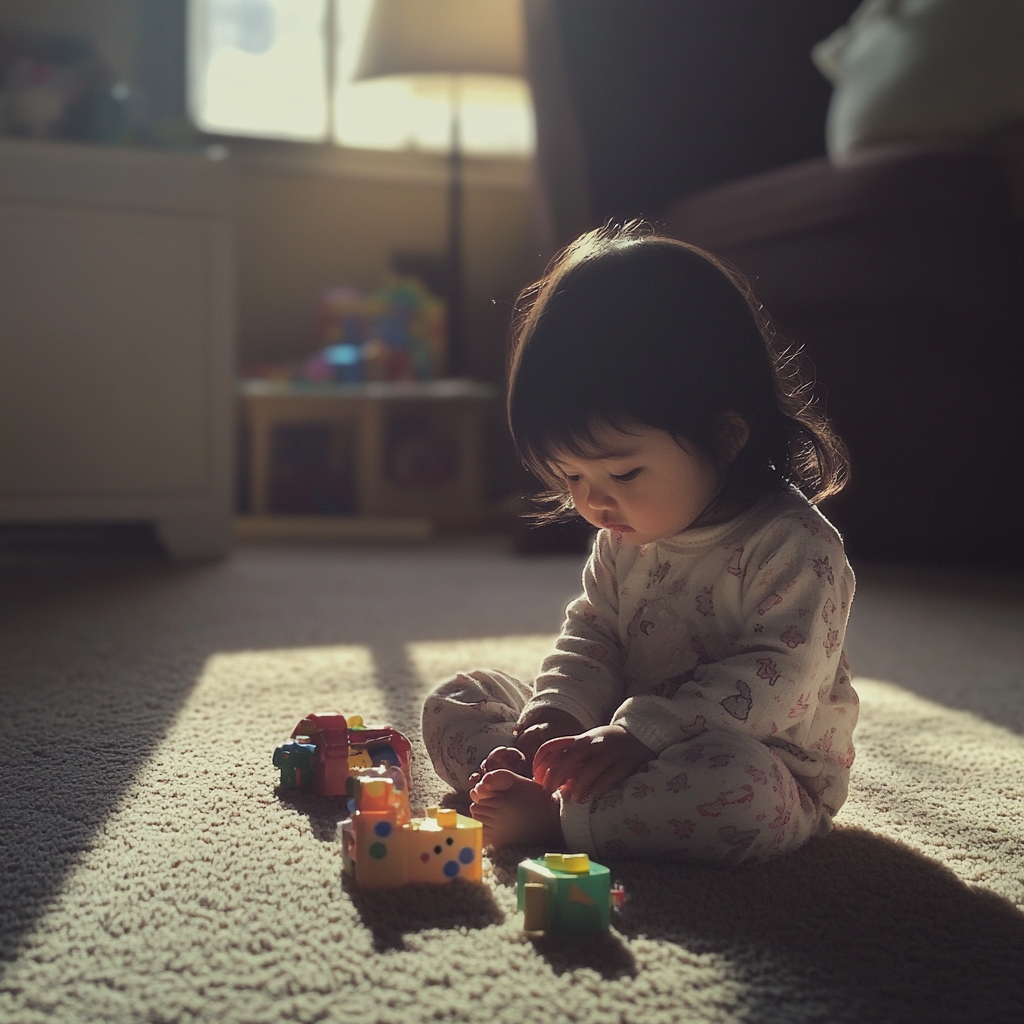
A little girl playing with toys | Source: Midjourney
That was until Sam.
We met when we were eight, two kids with no families, clinging to each other like lifelines. We learned to cook together, sneaking into the orphanage kitchen at night to steal peanut butter or test recipes that we saw on TV.
We dreamed of becoming chefs, of running our own restaurant someday.
“One day, Kera,” Sam said. “One day, we’ll have big kitchens and lots of money! And we can buy all the food we want.”
“I know,” I said, smiling.
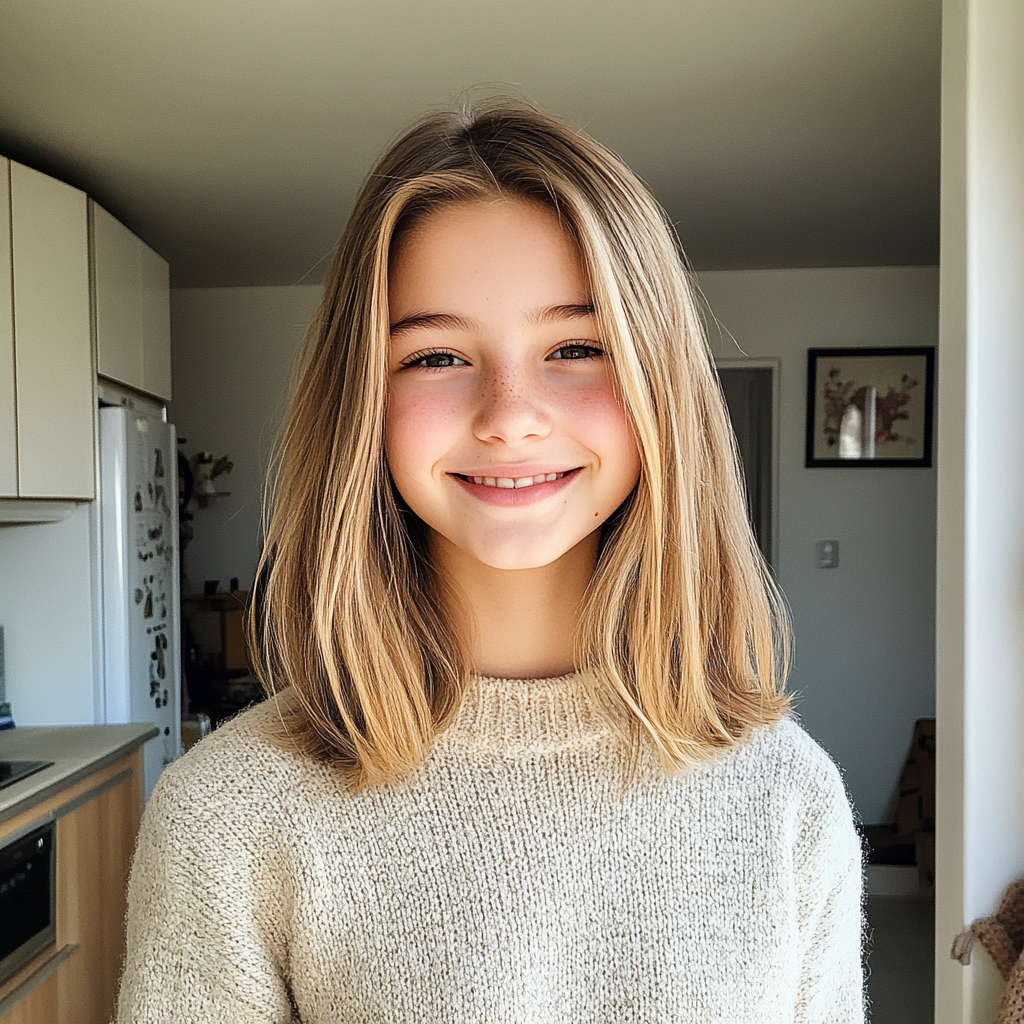
A smiling teenage girl | Source: Midjourney
It felt good to dream. It felt good to look forward to something. To see a future that was bigger than we ever thought we could have.
And we worked for it, too.
We got into culinary school on scholarships and hopes. And, surprisingly, we graduated at the top of our class. We thrived on creativity and passion. On the days we felt like giving up, we pushed through. We pushed each other, and if we fell, we fell together.
“I’ll always be here, Sammy,” I told her one day after we ended up in the ER.

A woman standing in an ER | Source: Midjourney
Sam had been too enthusiastic when chopping up herbs and had an incident with a knife.
“I know, K,” she said, smiling through her painkillers. “It’s together or nothing, right, sis?”
Eventually, we landed jobs at one of the best restaurants in the city. We didn’t know how Lady Luck kept shining on us, but we were grateful that she did.
Side by side, Sam and I climbed the ranks, proving ourselves in the brutal, high-pressure world of professional kitchens.

A woman working in a professional kitchen | Source: Midjourney
So when the head chef position opened up, we were both the top candidates.
That day, after the announcement, Sam pulled me aside.
“No matter what happens, let’s not let this ruin our friendship, okay?” she said, squeezing my hand.
I smiled.

A woman working in a professional kitchen | Source: Midjourney
“Of course,” I said. “Nothing changes. But I am starving. Let’s get some food on our break. A greasy cheeseburger from that place down the road sounds like it would hit the spot.”
She smiled back, but there was something… off. A little too much relief in her voice, like she already knew how this would play out.
“Sure,” she said. “Let’s meet there. I have something to do first. A pharmacy run, you know.”

The interior of a pharmacy | Source: Midjourney
I ignored the feeling. Sam was my best friend, after all.
But I shouldn’t have ignored any of my feelings. The first worrying sign was when Sam didn’t meet me for lunch during our break. She just didn’t show up.
That evening, after the dinner service, I was cleaning up my station when our boss, Chef Reynard, stormed into the kitchen. His face was like stone, his sharp blue eyes locking onto mine.

Food on a pass in a kitchen | Source: Midjourney
“I didn’t expect this from you, Kera!” he thundered. “I thought you were better…”
Silence fell. The entire staff froze, utensils clattering, conversations dying mid-sentence.
“Chef?” I swallowed hard.
He turned to the room.
“Everyone, to the break room. Now!”
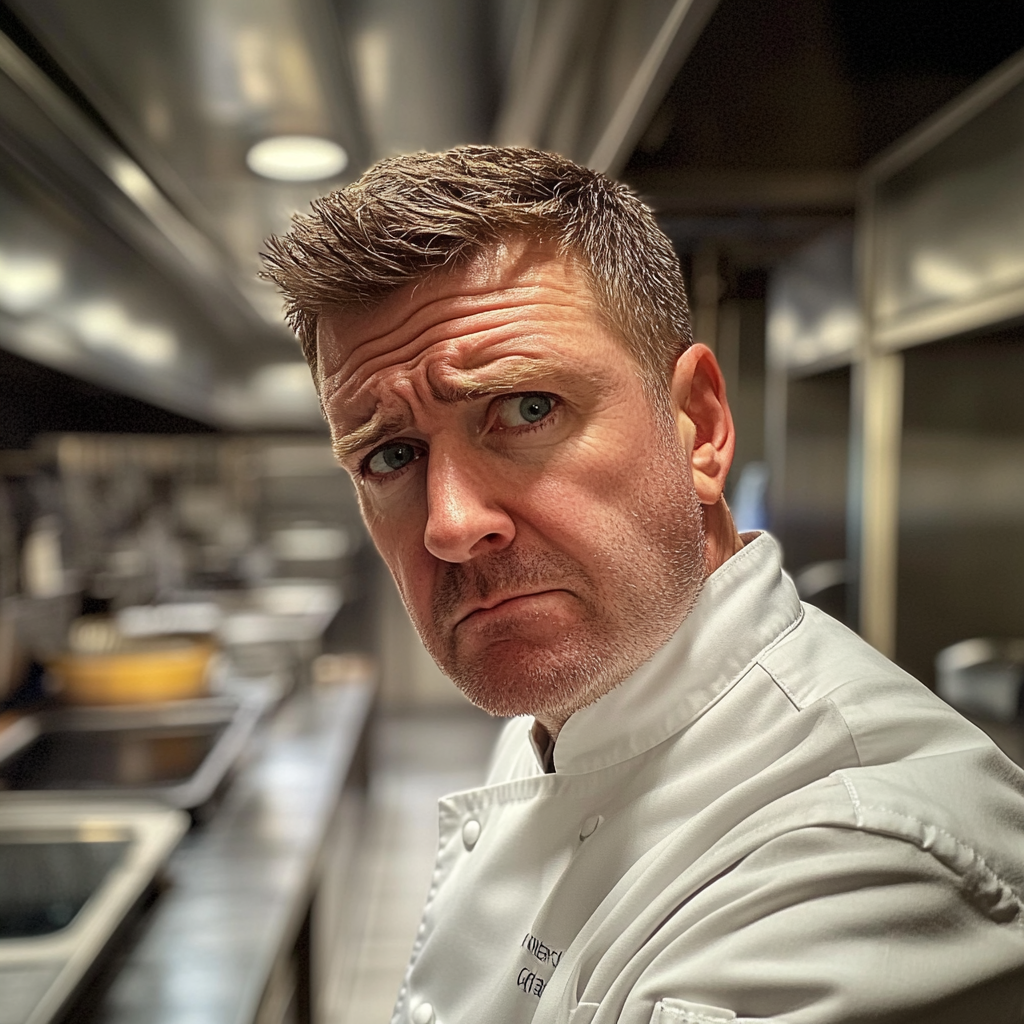
An upset chef | Source: Midjourney
The weight of his words sank into my stomach like lead. Something was very, very wrong. What was Chef on about?
We filed in, confused, exchanging nervous glances. Chef Reynard stood at the front, arms crossed, his expression unreadable.
“This evening, during an inventory check, something was found,” he said. “Stolen black caviar. In Kera’s bag.”
I stopped breathing. I broke out into a sweat. I felt dizzy.
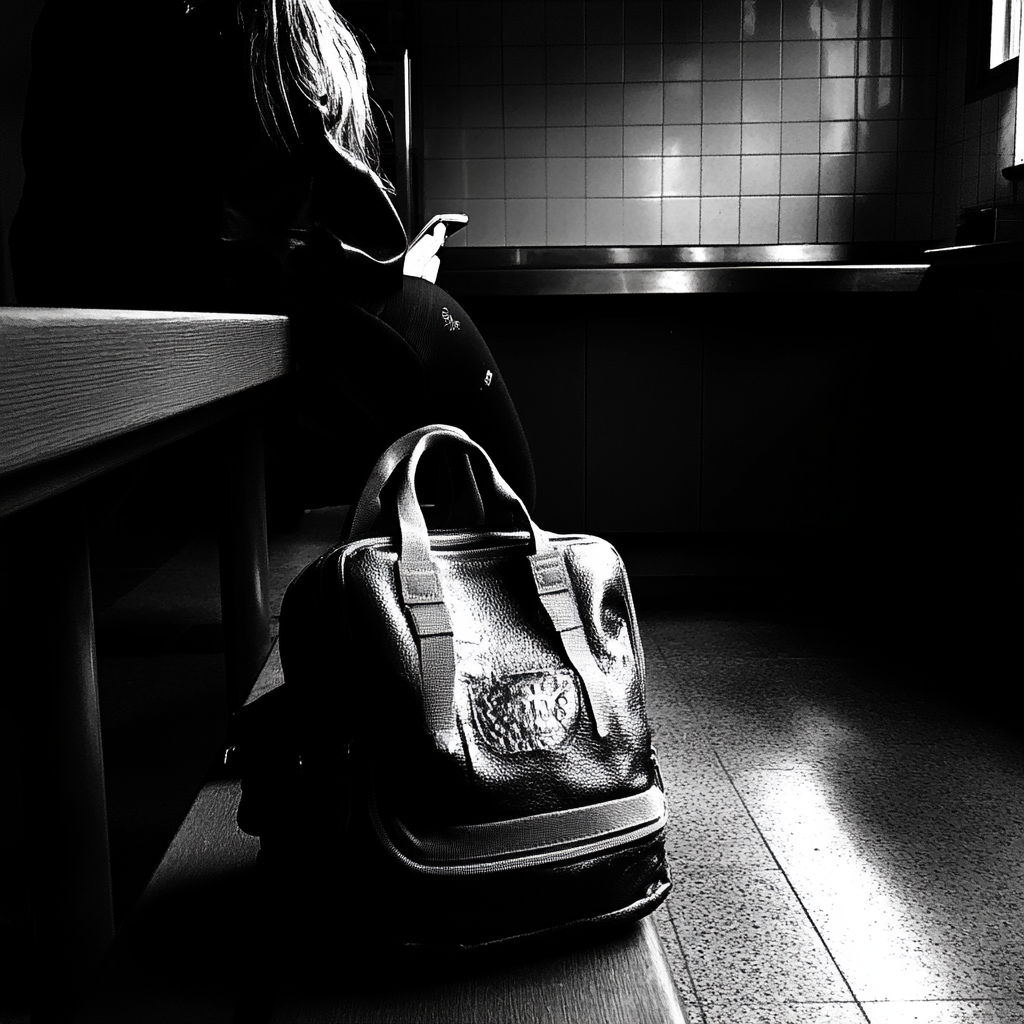
A woman’s bag | Source: Midjourney
My bag?
My stomach twisted into a hundred knots.
“That’s impossible!” I gasped.
Chef Reynard didn’t react.
“I announced earlier today that I’d be doing an inspection. Someone’s been stealing from my kitchen.”
His eyes were sharp, scanning the room.
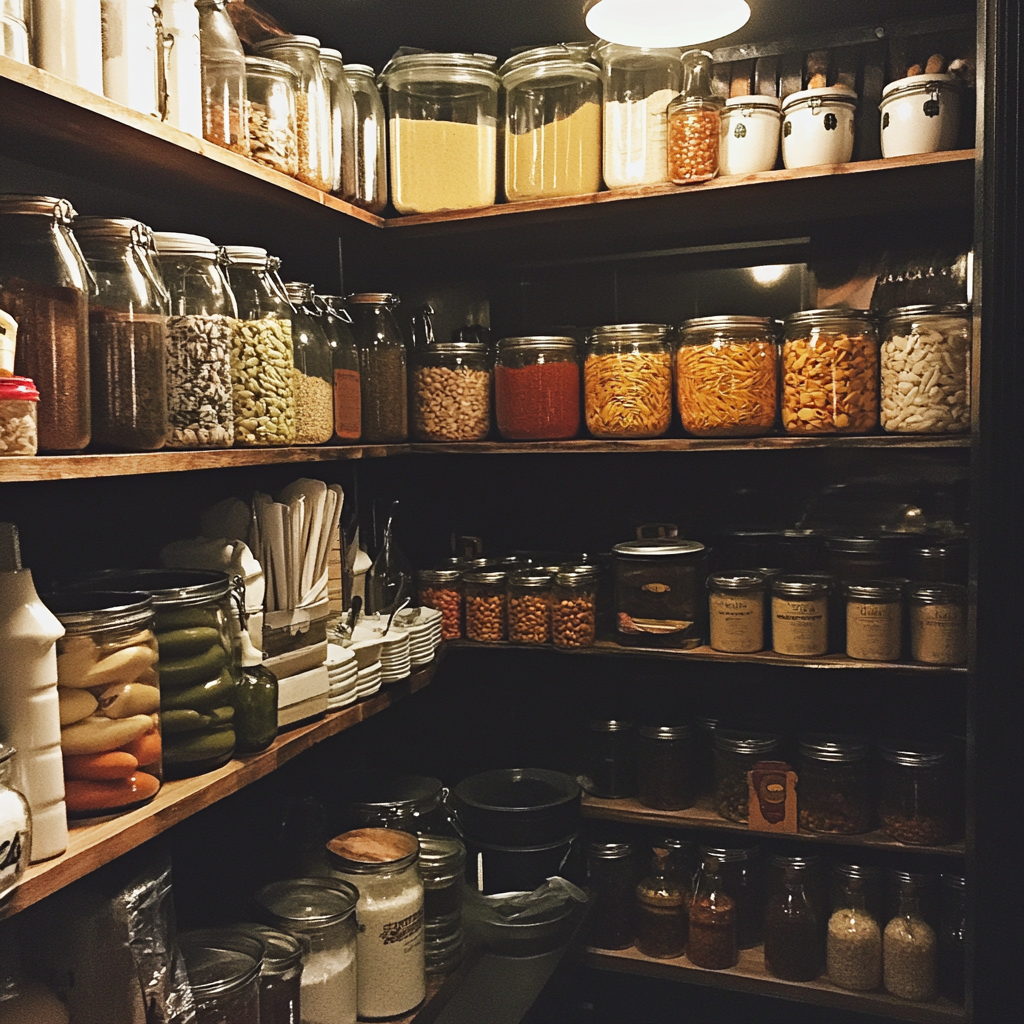
A pantry | Source: Midjourney
“And tonight… I found this.”
He held up a small glass jar of caviar, the kind we only used for high-end VIP guests who ordered top-shelf alcohol like it was absolutely nothing.
I stared at Chef’s hand, looking at the glass jar like it was a snake, waiting to strike.
“I didn’t take that,” I said, my voice hoarse. “I swear on my life, Chef. I would never… I would never jeopardize my position here!”
“Then, Kera, how did it end up in your bag?” His voice was calm but firm.

A jar of caviar | Source: Midjourney
I opened my mouth, then shut it. I didn’t have an answer. I felt dizzy.
Sam sat beside me, her hands clasped in her lap. She wouldn’t meet my eyes. She didn’t offer an encouraging smile. Or a hand squeeze.
A sick feeling curdled in my gut.
Chef Reynard exhaled.
“Tell me why I shouldn’t fire you right now.”
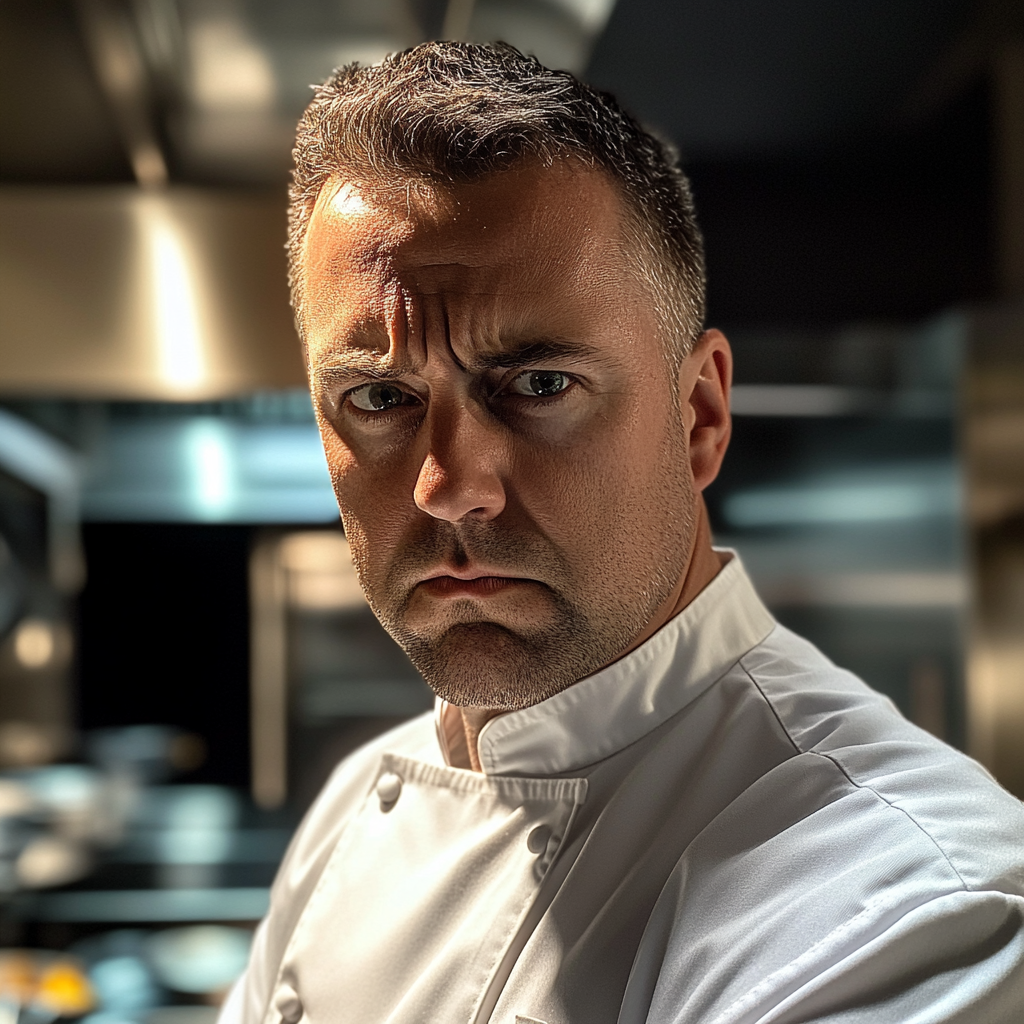
An angry chef | Source: Midjourney
I froze.
“Come, Kera. Tell me.”
Tears burned behind my eyes.
I looked around the room, at my coworkers, at the people I had worked beside for years. Some of them looked skeptical. Some looked outright disappointed.
But Sam?
She just sat there. Silent.

A woman sitting | Source: Midjourney
That’s when I knew.
She knew about the inspection. She was the one who did it. Her eyebrows were furrowed like they always were when she was up to something.
Chef Reynard had been on the phone earlier that morning, talking about the missing inventory, saying that he planned to check bags after our shift. But I hadn’t thought anything of it. There was no reason for me to.
But Sam had overheard. When we were changing into our uniform in the locker room she smacked my arm to make me stop talking so that she could hear what Chef was saying.
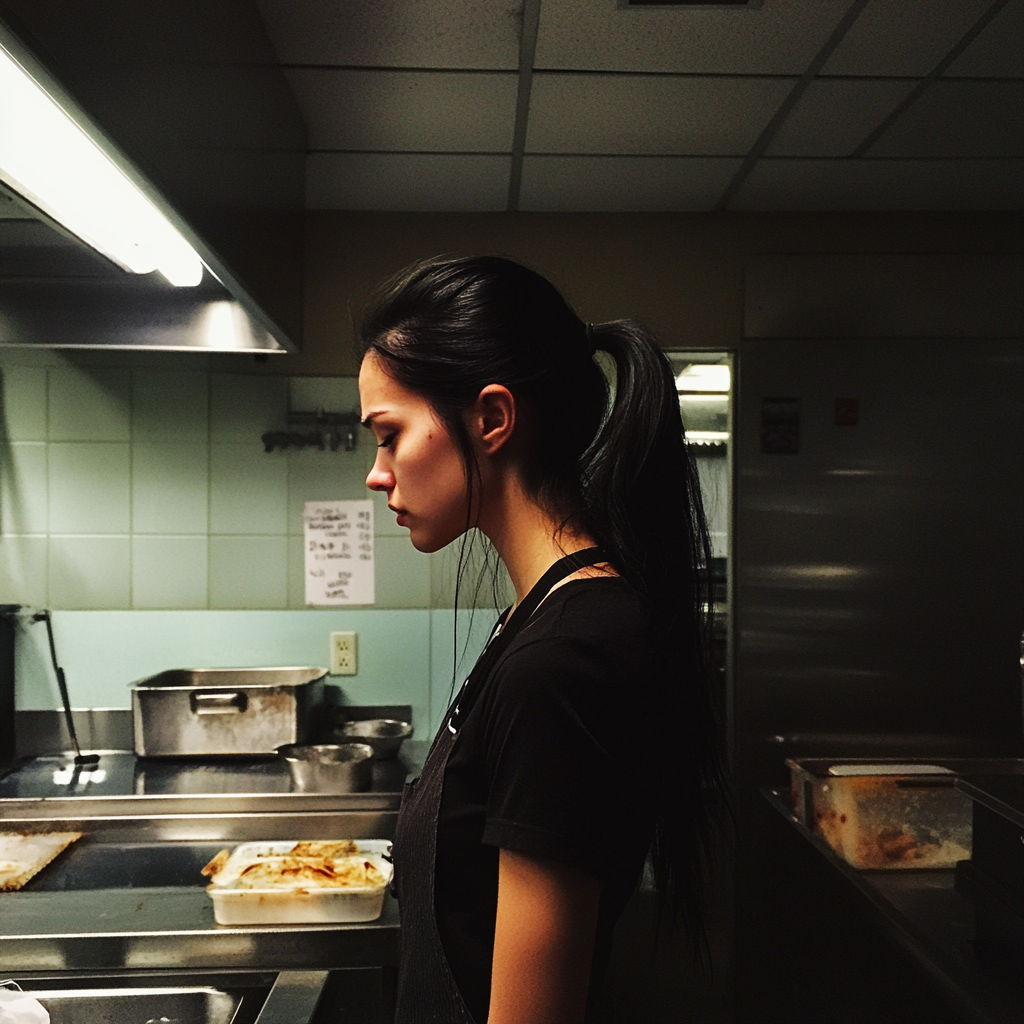
A woman looking down | Source: Midjourney
But… Sam? Would she really do that to me? Or was my imagination just running wild because the thought of me losing my job was so… close?
I felt the knife twist before I even knew it was there.
I stood up, my throat closing.
“I…” I couldn’t even get the words out.
“I should go…”

An upset woman | Source: Midjourney
Chef Reynard didn’t say anything. He just looked at me for a moment, his eyes softening.
I wanted to cry. I wanted to curl into a ball and just cry for a few hours. My career, everything that I had worked so hard for, was over.
I turned toward the door, my heart shattering.
“Stop, Kera,” he said.
I turned back, blinking through tears.

A door in a restaurant kitchen | Source: Midjourney
Chef Reynard reached into his pocket and pulled out a small ultraviolet flashlight.
The room went still again.
“There’s a security measure in place,” he said, his voice even. “I have marked all the caviar jars with an invisible, transparent ink, one that leaves residue on anyone who touches it. This is the new batch, and no one has worked with these yet, so only the person who stole the jar would have the stuff on their hands.”
A ripple of murmurs swept through the staff.
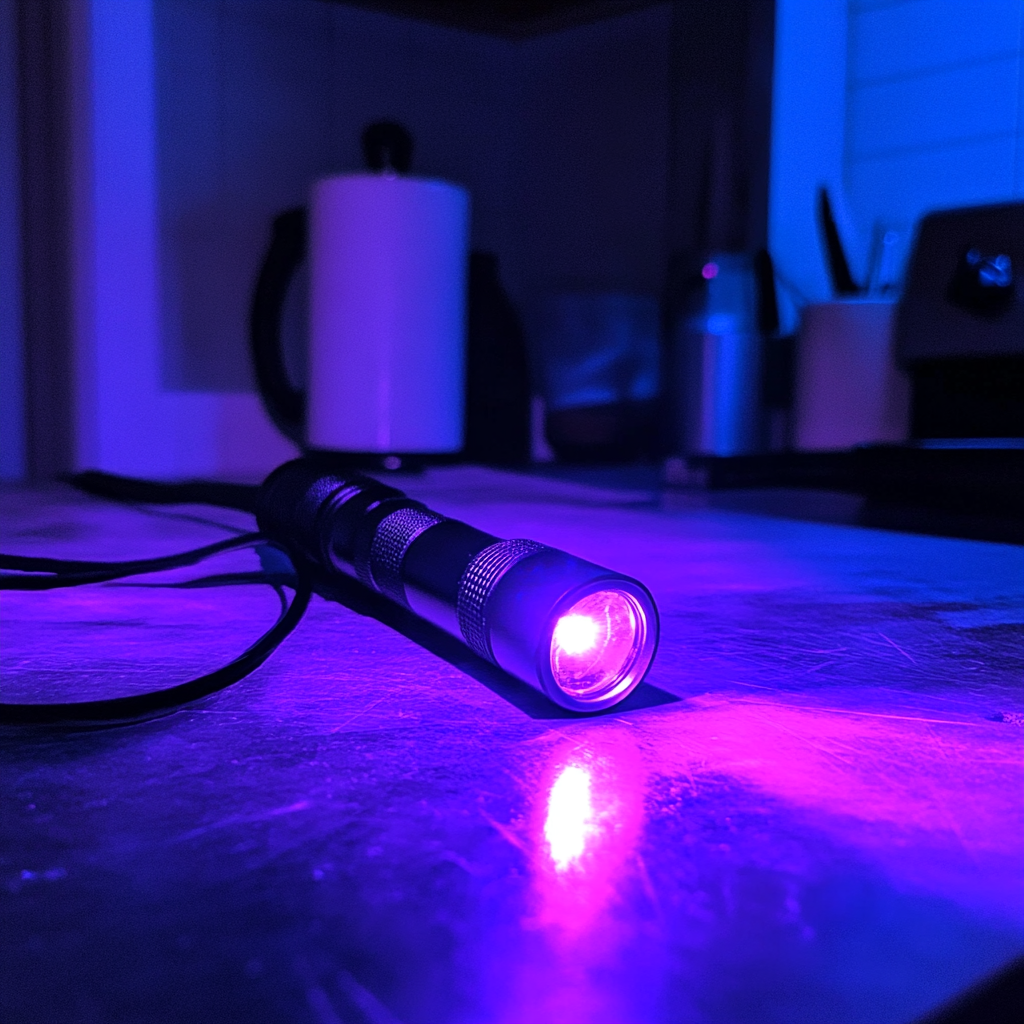
A flashlight | Source: Midjourney
He held the jar under the light, and sure enough, a faint, glowing mark was smeared along the lid.
“We started doing this a few years ago when we had another case of sticky fingers. One of our waiters was walking away with our caviar and bottles of champagne, ready to sell on the internet.”
Then he turned the light to his hands. They were clean except for his fingers, where he had held the jar moments before.
His eyes met mine, and he almost smiled.

Bottles of champagne | Source: Midjourney
“Everyone, hands out. Now.”
One by one, we stretched our arms out as he held the light to them.
Nothing.
Nothing.
Nothing.
Dirty nails.
Nothing.
Then…
A faint glow appeared on someone’s fingertips.

Ink on a woman’s hand | Source: Midjourney
That’s when the entire world tilted.
Sam.
The soft blue stain lit up on her skin, it was unmistakable. A choked sound left my throat. My best friend, my sister, sat there, caught red-handed.
Chef Reynard stared at her in disbelief.
“I need you to explain yourself,” Chef said.
“I… Chef…” Sam tried to say, her face drained of color.

A shocked woman | Source: Midjourney
“I never thought someone would do this to their best friend,” he said quietly.
Then, his voice hardened and his face darkened, anger taking over.
“You set her up? You set Kera up? You were willing to destroy her career for a promotion?”
Her mouth opened, desperate.
“Maybe someone else touched it before me… and I touched something they touched.”

An angry chef | Source: Midjourney
Chef Reynard didn’t even blink.
“Just go, Sam.”
I watched her grasp for anything to save herself. But there was nothing.
She knew it.
I knew it.
She stood abruptly, her chair scraping against the tiles. Her eyes flicked to me, just for a second.

An upset woman | Source: Midjourney
And in that second, I saw something that made my blood boil.
Sam didn’t think she’d get caught.
She wasn’t sorry. She was angry.
She stormed out, and just like that, she was gone.
The room was silent.
I was still shaking. I felt betrayed and hurt, heartache worse than I’d ever felt before.

A shocked woman | Source: Midjourney
“Kera,” Chef Reynard said.
“I meant what I said,” he continued. “I don’t tolerate thieves in my kitchen. And I couldn’t believe that it was you. I just… couldn’t. Let’s go to my office.”
We went to his office. I followed him quietly, my hands still shaking.
“Kera,” he said, sitting down. “I didn’t want to believe it because I had just drawn up something for you. But I need you to know that I don’t tolerate people who betray their own.”

An office | Source: Midjourney
He placed a single piece of paper in front of me.
A contract.
“You worked your butt off for this place, my girl,” he said. “I’ve noticed it from the beginning. And you’ve earned your spot as head chef.”
I took a deep breath.
“I had nothing to do with Sam’s actions,” I said. “Absolutely nothing.”
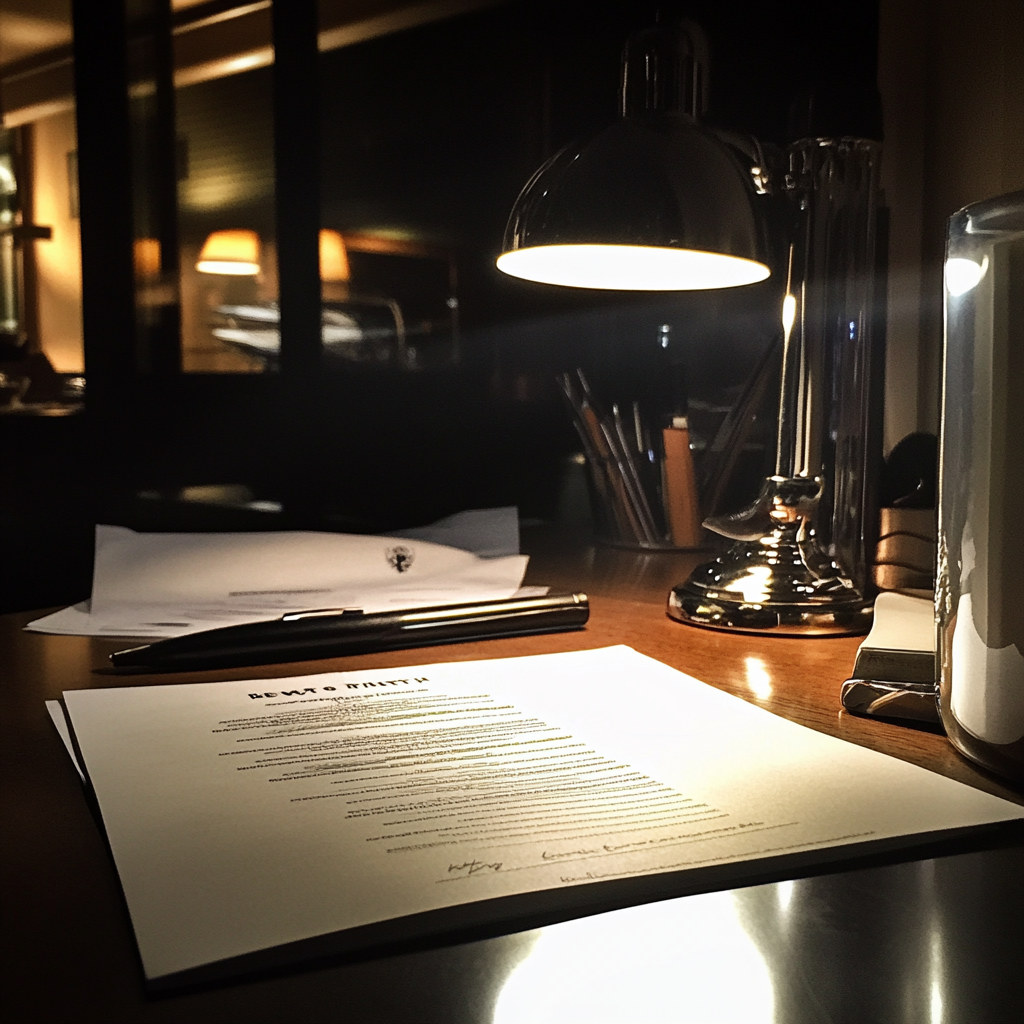
A contract on an office desk | Source: Midjourney
He smiled and held a pen out for me.
And I signed my name.
After my shift, I stopped at a food truck on my way home, trying to wrap my mind around everything. How was I going to go to our apartment and face Sam?
I wanted to slap her for almost costing me my job, but I was also worried about what she was going to do next.
I had been saving over the years. Sam had not, wanting to spend everything on clothing and alcohol. I highly doubted she had any savings, or at least enough to get by until she got a new job.

People outside a food truck | Source: Midjourney
But I shouldn’t have worried.
When I walked into our apartment, Jenna, our roommate, was sitting on the couch playing video games. Sam was nowhere to be seen.
“She’s gone,” Jenna said, pausing the game.
“What do you mean?” I asked.
“She’s gone. She packed up, and some guy named Dylan came to help her take her things. She said to tell you that she wanted more for herself and that she needs to find her happiness out of your shadow.”

A woman playing video games | Source: Midjourney
What the actual heck?
“Thanks, Jenna,” I said, flopping down on the couch next to her.
“What happened? She got fired? She quit?”
“How about I tell you tomorrow?” I asked. “I just want to get into bed.”
I was devastated, but I had never felt the way I had before. There was so much anger and hurt. Pain that demanded to be felt.
If this is what Sam was truly capable of, then maybe I was better off without her.

An upset woman lying in her bed | Source: Midjourney



Leave a Reply